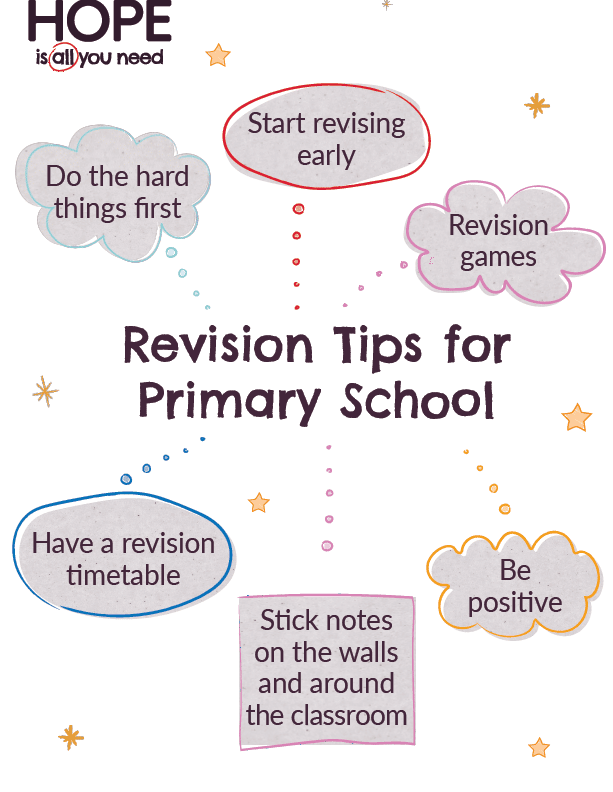Revision Tips for Primary Schools
Primary school revision is vital for children to progress onto their next steps. Whether your pupils are preparing for their SATs or Non-verbal reasoning test, it is important to guide them with their revision. We understand that it can be difficult for teachers to help children with their revision so we have created some revision tips that you can use in the classroom.
Create a comfortable environment
The first revision tip is to make sure that your classroom has a space that is comfortable for your pupils. This needs to be a quiet area so that they can focus on their revision without getting distracted. Allow your pupils to be near each other so that they can help each other if needed. Sometimes, working together is the best way to revise.
Make sure the space is away from the tables as it will be used for a small amount of time but often throughout the day. You could have a comfortable set up in the corner of the classroom or use a reading corner if you have one. Soft furnishings and plenty of natural light is a must for children to concentrate. Have the space tidy with all the resources needed in an accessible place. This way your pupils can sit down straight away and revise.
Have short but often revision sessions
Revision sessions need to be short but often due to the little attention spans of children. They can stay focused for around half an hour so that is an optimal amount of time for revision. If you block revision sessions for longer than this, your pupils can get distracted. This will lead to information not being taken in which essentially wastes everyone’s time. Think carefully about this when it comes to scheduling your class‘s revision times.
Create a revision timetable
Once you have thought through the revision sessions, create a timetable for them. This needs to be strategically thought through, especially due to having short but often sessions. Do this timetable for during the school hours around the lessons that you have planned. Around three short revision periods will be enough each day. Make sure you don’t overwhelm your pupils with too much revision as the key information won’t stick.
Pin the revision timetable up in the classroom so that the children can have a reminder of when revision time is. Also, hand out the revision timetable to each pupil so they have their own copy. This makes sure that they know when they need to focus on revision.
Use lots of practice exam papers
This is the best way that children can be prepared for their tests. It lets them know what sort of questions to expect when sitting their SATs or other tests. If you prepare plenty of practice runs with previous years papers, your pupils will start to feel more confident. Plus, this allows you to identify any gaps in your classes’ knowledge as well as spotting if any pupil is struggling. From these practice runs you can offer additional support to individuals and plan what areas need to be covered more in lessons. This will ensure that your class are fully prepared and feel confident about sitting their tests.
Have plenty of pens and pencils available in the classroom for pupils to use to practise writing the answers out. Have exam kits too that the children will need for certain subjects. Using the right tools whilst practising will make sure that they are comfortable with using them for the test.
Tackle the difficult things first
From the revision sessions and practice papers, teachers can identify what the children are struggling with. If it is a gap in most of the classes’ knowledge, then this needs to be addressed quickly. Make sure you tackle the problems head-on and plan lessons on them so that your pupils can understand the subject. Do a few lessons on the subject so that it sticks in your pupils’ minds therefore, they will be able to answer questions about it.
By scheduling extra lessons on the difficult subject, you show your class that you don’t shy away from hard tasks. This will teach them to do the same as they will see how difficult things can be easily resolved. There’s no point in hiding from difficult things otherwise there will be limited time before the tests to sort it out. The quicker you can help your class, the more time your pupils will have to work on it.
Make sure your classroom has plenty of revision notebooks so that children can make notes on these important lessons. This way they can have the information written down so they can overcome the difficulties of the topic.
Have one to ones with your pupils
Allow your pupils to come to you if they need support, guidance, or extra help on subjects. Let your class know that you will be free during lunch time and after school so that they can have one to ones with you. This will let you know which pupils are struggling before it is too late. Listen to them and come up with solutions to their issues. You can also schedule some extra revision in that helps them further.
Having one to ones soothes children’s anxieties and gives them confidence for their upcoming tests. It is important for teachers to be there and help as much as possible so that their pupils are going into their tests prepared and able to answer all questions. It also makes sure that no one gets overwhelmed or feels like they can’t do it. Children carry a lot of weight on them during revision time and exams. They put a lot of pressure on themselves and if they are struggling, it can really affect their state of mind. By offering one to ones, you prevent that from happening.

Create revision games
As children’s attention span are only quite short, make revision more fun so they don’t feel like they are revising. This will keep hold of their attention as they will enjoy the sessions more than the traditional writing everything down. Making revision into games is perfect for children to remember key information easily. They will link the information needed for tests with fun games so will keep hold of it.
To help you with ideas of types of games you can include, we have created some examples for you:
1- Make revision raps or poems.
This allows children to remember information through pattern and rhyme. This is a great game to do for a lot of subjects, particularly English. Your pupils will have a tune to the information so that when it comes up in their tests, they can answer the question from the rap or poem.
2- Create quizzes on the topics your class are revising.
These can be short and interactive. Let the pupils work in teams for support whilst still being a competition. Have little treats to hand out when pupils get the questions right. This makes sure they are rewarded and having fun too.
3- Get the children to teach each other.
Pair your class up and let them take turns on teaching each other on different topics. This allows them to learn from each other as well as covering any gaps in their knowledge. One pupil may know more about a topic than the other so they can help them out. Plus, having a topic explained by classmates puts it in a way that your pupils can understand better. To make this more interactive, have mini whiteboards where they can explain what they mean to each other in a visual way. Have plenty in your classroom so every child can use them whilst having spares in case.
4- Pair questions and answers up in small groups.
Use revision cards to write down questions and their answers on separate cards. Mix them up on tables and let the children figure out the answer to the questions. They will have to find the correct answer and match it up with the question they have. This will help children to remember questions and their answers for the upcoming tests.
Additional revision tips- worksheet
Look at our worksheet for more inspiration on how to help your class with their revision. Print it out and hand out to your class too so they have some encouragement and help. Pin a few copies up in the classroom too so your pupils are surrounded by support during the revision period.
Use these revision tips to help your pupils be engaged in their revision. This will then make sure that the key information sticks in their heads and so are fully prepared for their tests. Use a mixture of traditional revision techniques such as writing information down on record cards, and more fun techniques. Make sure your classroom is fully stocked too so that children know what resources they need to use. Have storage for all revision guides and cards too so that your pupils can easily locate their notes when needed.
